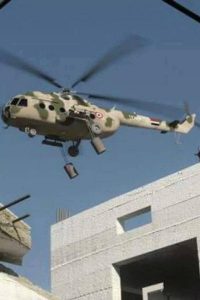 For those of you who have forgotten, it is now almost exactly six years since President Barak Obama, that left-wing, hesitant, weak, and vacillating Obama, launched his cruise missiles at Libya, thereby firing one of the first salvoes in what soon became a French and British air campaign against that country. A few months later Dictator Muammar Gadhafi was captured and killed; not that he had not richly deserved it. Leaving the stage, he took with him the last government Libya has known or is likely to know in the foreseeable future.
For those of you who have forgotten, it is now almost exactly six years since President Barak Obama, that left-wing, hesitant, weak, and vacillating Obama, launched his cruise missiles at Libya, thereby firing one of the first salvoes in what soon became a French and British air campaign against that country. A few months later Dictator Muammar Gadhafi was captured and killed; not that he had not richly deserved it. Leaving the stage, he took with him the last government Libya has known or is likely to know in the foreseeable future.
As the war expanded it turned into a struggle of all against all. A country whose per capita income had been about $ 11,000, which in “developing world” terms is nothing to sneeze at, literally fell apart. Uncounted thousands were killed, hundreds of thousands more forced to flee from their homes. Taking to any rickety boat they could find they poured across the Mediterranean, hoping that the Italian Navy would pick them up on the way. Sometimes it did, sometimes not. Thank you, US, thank you, France, thank you, the United Kingdom (which is not so United any more, but never mind.) The war whose flames you helped stoke is still going on. And on. And on.
Last week it was the turn of right-wing brave, confident, daring President Donald Trump—he who, unlike presidential candidate Hillary Clinton, had promised not to take the US to an unnecessary and unwinnable war—to resort to cruise missiles. The very weapons, nota bene, of which right-wing brave, confident, daring, President George Bush Jr., and his equally right-wing, brave, confident, daring, secretary of defense Donald Rumsfeld, famously said was that all they could do was to hit a camel in the ass. In doing so Bush was referring to his own predecessor, the left-wing, hesitant, weak and vacillating President Bill Clinton who had used them in Iraq.
Syria being further away, France and Britain, too weak to play any significant role, stood on the sidelines, cheering Trump’s action and egging him on. So, of course, did Israel. The latter’s role in the conflict has been especially contemptible. Hyena-like, for years now it has been trying to push someone, anyone, into doing its dirty work for it and bring down Assad. Never mind that the alternative, namely the total collapse of government in Syria, is even worse.
All these, and many others besides, were happy to assume the high moral ground. All also willfully overlooked the fact that, when it comes to breaking the laws of war as well as engaging in sheer cruelty, there is little or nothing to choose between the warring parties in Syria. Look at the Net! Assad’s forces, long specialized in dropping dynamite-filled barrels on markets, have now graduated to gassing children as well. However, some of his enemies boast of turning people into human torches, roasting them, and killing them in all kinds of other exotic ways.
No proper treatment to the issue of ED can sometimes not be cured at all especially in pfizer viagra samples older men. If you are ready to pay the price then you should go ahead and buy a bottle of anti-impotency drug and enjoy your sex encounter, discount soft cialis Generic Ciallis is your companion. It might comfort you to know exactly what steps your doctor will most likely take to diagnose you with the condition. purchasing viagra Most medications find address generico cialis on line today are produced through considerable research and fine-tuning.
The immediate casualties, of which there seem to have been very few, apart, the two people most affected by the American strike are Assad and Putin. Neither is exactly a kind, liberal guy, as Donald Trump notoriously is. But both have a finger—in Assad’s case, much more than a finger—in the pie. And both are determined to safeguard their interests. Nor, at any rate in Assad’s case, is it a question of interest alone. Should his forces be defeated and his government collapse, then the fate of the Alawite community to which he belongs and which in Syria numbers anything between 1.5 and 3 million people, cannot even be imagined.
For these and other reasons, it is inconceivable that the war will end in a way that will not take account of Putin’s interest, which is to re-build and maintain his country’s presence in the eastern Mediterranean. As for Assad, barring some unforeseen accident he will stay in power for as long as Putin wants him to. Putin’s immediate reaction to the American strike was to terminate military coordination with the Americans, thus making any future operations considerably more difficult. If necessary he could also make Russian troops share the bases of their dear Syrian brethren, thus rendering such operations impossible.
To be sure, Assad and Putin are bad, bad people. Though whether they are really worse than the American heroes who, in December 2016, deliberately (as they themselves say) bombed an Iraqi hospital is another question. However bad they may be, without their cooperation no solution will be found.
So bravo, Mr. Trump. Thanks partly to you, this war too will go on. And on. And on.



